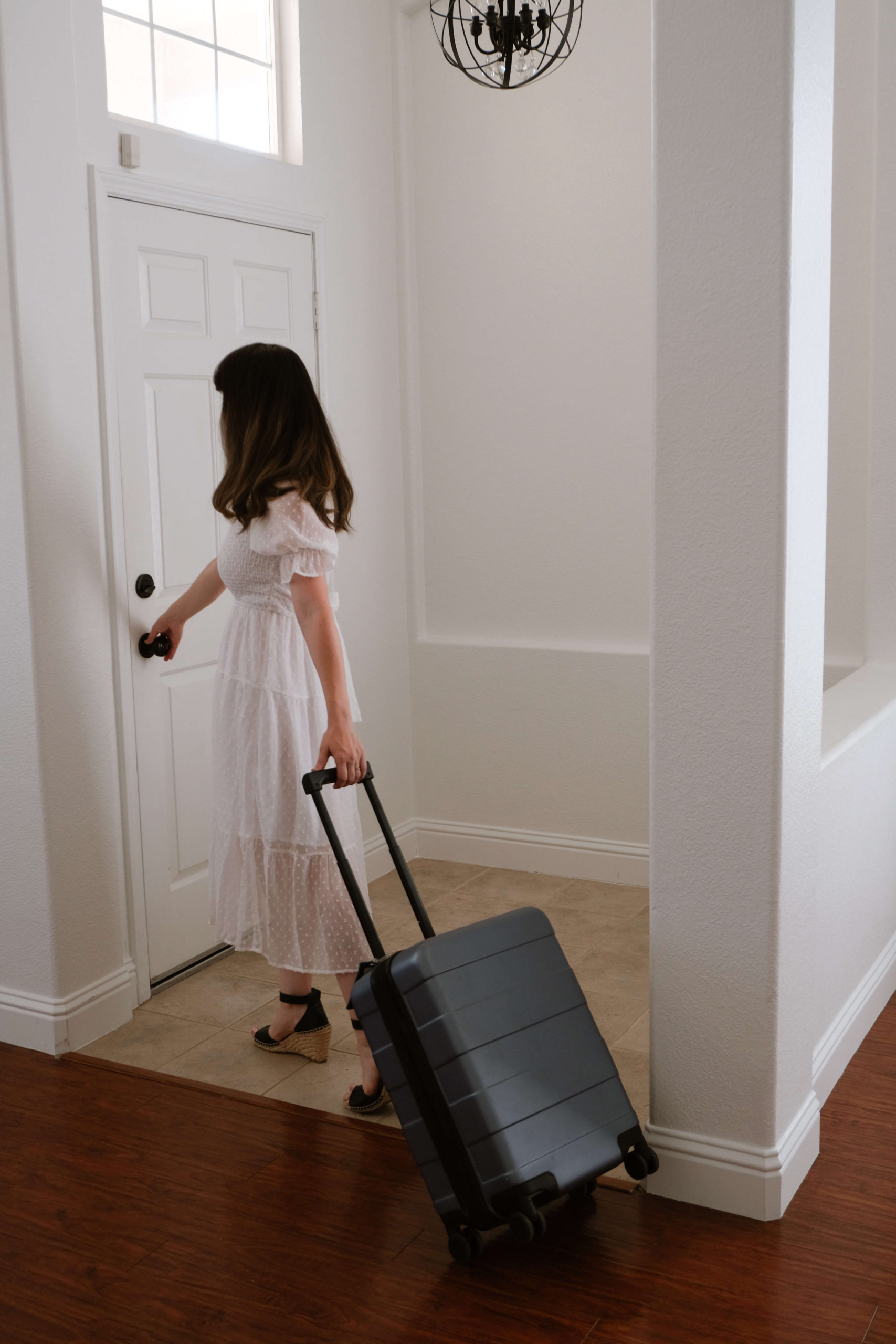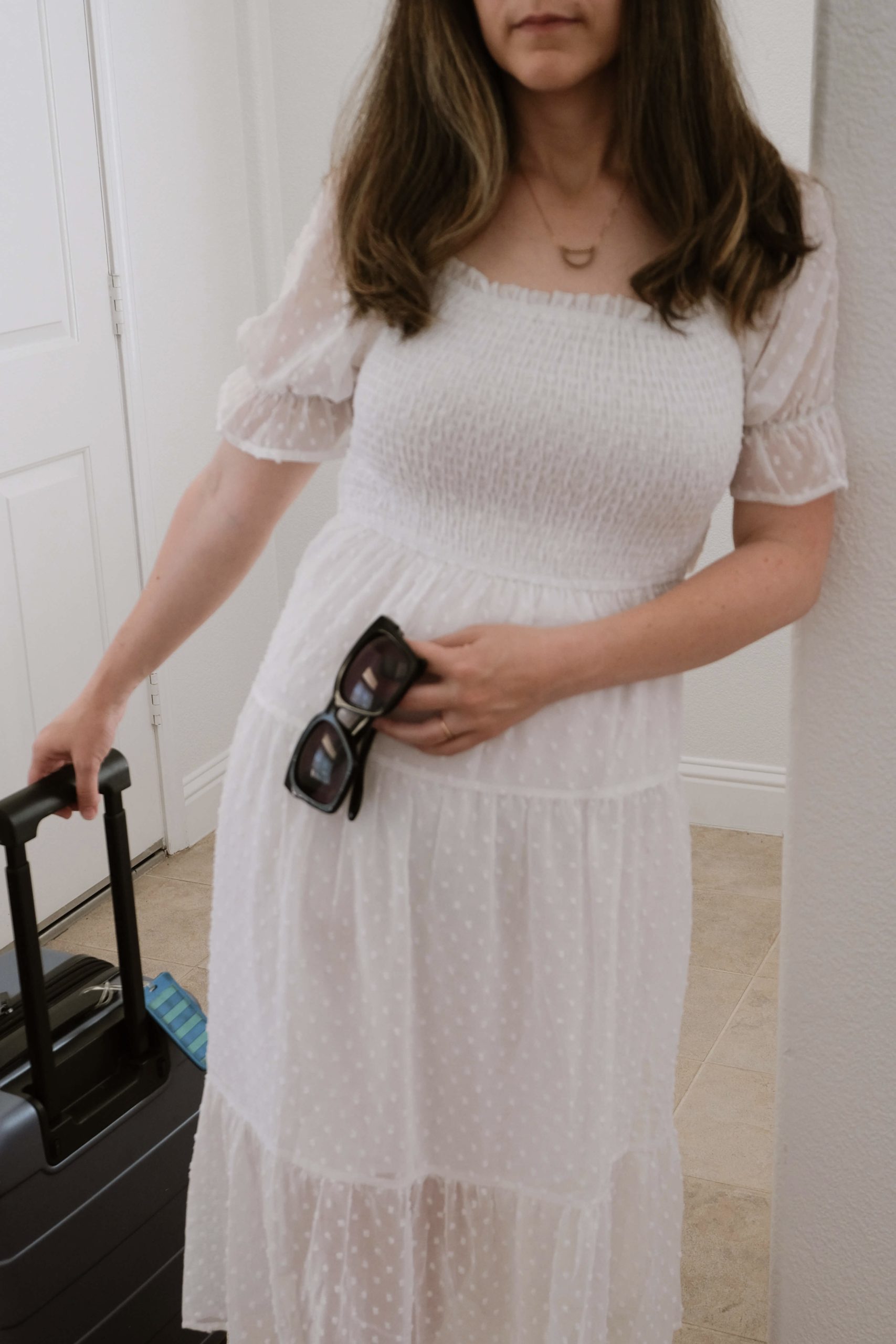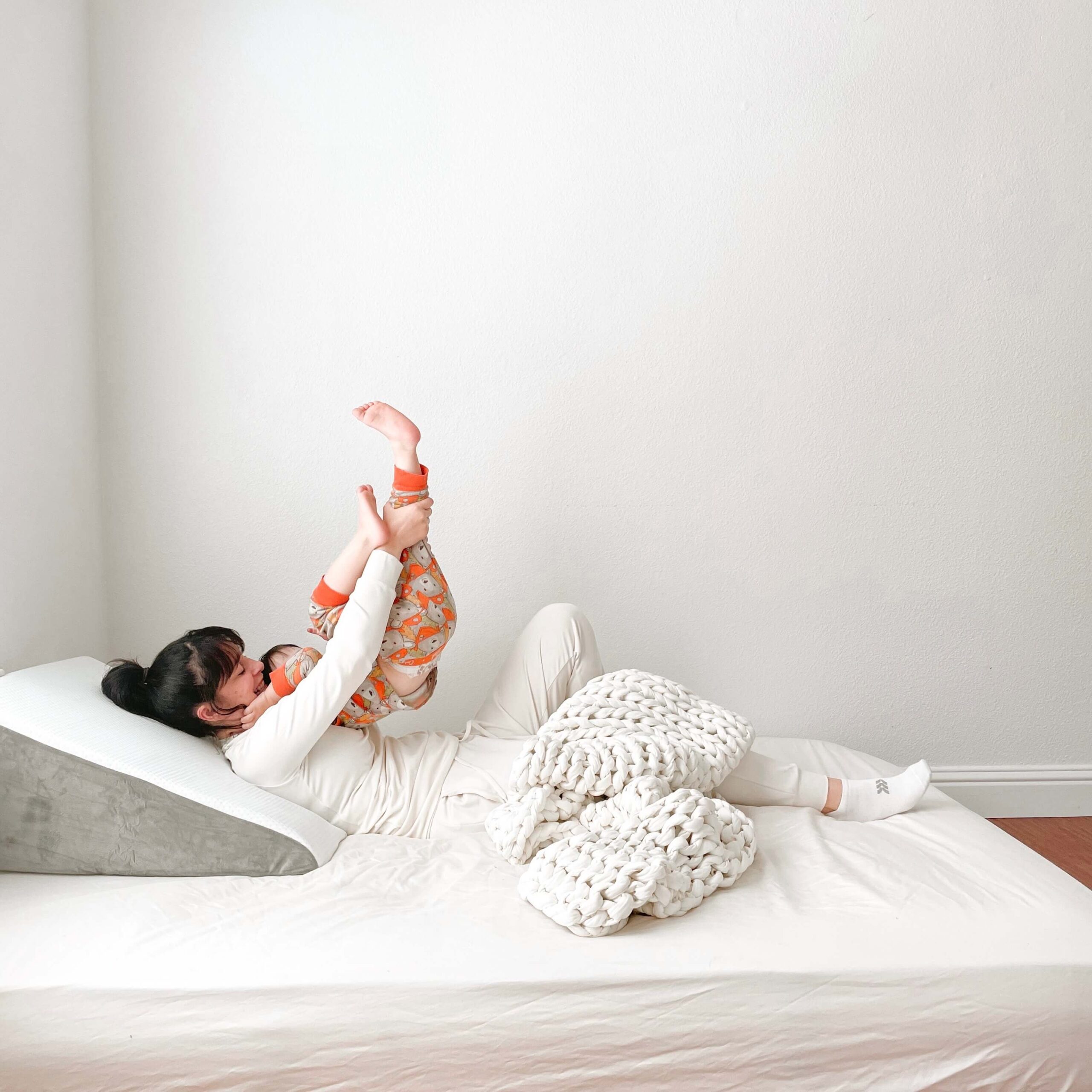There’s a special sense of doom reserved for bedsharing moms who know they’ll need to spend a night away from their toddler. How will their toddler sleep without them for the first time in their life?! Here are ten tips to make the ordeal smoother for you, your toddler, and their caregiver.
10 Tips For Leaving Your Toddler Overnight For the First Time
- Choose the Right Caregiver
- Night-Wean Your Toddler Beforehand
- Teach Your Toddler a Simple Phrase About Your Trip Well in Advance
- Bake With Your Toddler the Day Before You Go
- Make Family Photos Easily Accessible For Your Toddler While You’re Away
- Arm Your Caregiver With Lots of Distractions For Your Toddler
- Call Your Toddler to Check In BEFORE They Get Sleepy That Evening
- Have Your Caregiver Cosleep With Your Toddler That Night
- Remind Your Caregiver That There Is No Set Schedule For the Night
- Have Fun Things Lined Up For the Next Morning
Like me, you may have no desire to leave your toddler overnight. You may successfully go years without it having to happen.
But eventually, you may need to be away for a night.
In our case, we were forced to leave our two-year-old, Cubby, overnight when I delivered his little brother. I dreaded it for my entire pregnancy, and I learned a bunch along the way.


dress | sandals | suitcase | sunglasses
1. Choose the Right Caregiver
This is the absolute most important factor in this whole discussion!
You need to choose the right person to stay home with your toddler.
Your caregiver may be up all night comforting your child, heating up breastmilk, texting you back and forth. They are probably not going to get a lot of sleep. They’re going to have to go with the flow and follow your toddler’s lead.
This takes a special kind of person!
Get your toddler and caregiver together beforehand, if you can. They can spend time together, make memories and inside jokes, and even hang out alone for a little bit. This will be great preparation for the big night.
Note: In this post, I’ll be referring to your caregiver as she/they for the sake of clarity. You can choose any exceptional human being as your caregiver. 😉
We decided that my mom was this person for little Cubby. We were living across the country from each other, though, so she would only be flying in two weeks before my due date.
I thought about how I could get Cubby really comfortable with her beforehand. Even though he knew who she was, I wanted him to see her face.
So we did lots of video calls. And on these calls we would talk about how she was going to take the airplane over here, and then she’d be here for a couple weeks, and then, “Mommy and Daddy would go to the hospital to get Baby out.”
We walked him through it over and over and over.
And during those two weeks that she was here before I went into labor, I tried to let them have tons of alone time. They’d go out in the backyard or walk to the mailbox together.
I wanted Cubby to be able to remember that he’s been alone with her before, and everything was fine. And he was safe and happy, and we all love him.
2. Night-Wean Your Toddler Beforehand
Now this is just going to make it much easier for your caregiver and your toddler — it’s not mandatory!
But think about it. If you’re toddler’s used to you rubbing their back or singing their song to them when they wake up during the night — that’s going to be a lot easier for your caregiver to do in your absence!
However, if your toddler is used to waking up throughout the night to nurse, you’re going to need to pump beforehand and have milk ready to go in the fridge. (That’s if they’re used to drinking from a bottle.)
And you’re going to need to leave detailed instructions for your caregiver like where to find it, how many ounces to give, how to heat it up, etc.
And it could get a little tricky in the middle of the night if your toddler is having a meltdown because they’ve realized that their parents are gone. So while your caregiver is heating up the milk, she might not be able to give it to your toddler immediately.
And, well, toddlers aren’t exactly known for their patience.
It could get dicey at 2 a.m. This is why choosing the right caregiver is key.
3. Teach Your Toddler a Simple Phrase About Your Trip Well In Advance
As soon as you know about your night away, create a mantra or a one-sentence phrase that you can start saying to your toddler that explains where you’re going to be or what you’re gonna be doing while you’re away.
When I was about three months pregnant, I started talking about it with Cubby. “Mommy and Daddy are going to the hospital to get Baby out.”
So he knew exactly what was going to happen for months and months and months beforehand.
Now, if you can’t plan your night away well in advance, that’s okay! It’s just helpful if you can get the idea in your toddler’s brain as soon as possible that there’s going to be a time when you’re not going to be here.
Another reason why this mantra is really important is because your caregiver is going to say it.
When Cubby woke up many times throughout that night, my mom said to him, “Mommy and Daddy are at the hospital to get Baby out.”
She said the same exact thing that we had been saying for months and months! And that reassured him. It was as if he realized, “Okay, my parents and my grandma are all saying the same thing. It’s going to be okay.”
So if you have an emergency contact sheet or instructions on the fridge, make sure you put that mantra right at the top so that your caregiver is ready to say it any time your toddler asks where you are.
(And they’ll probably ask a lot.)
4. Bake With Your Toddler the Day Before You Go
The day before your big night away, make something with your toddler. It could be cookies, brownies, breakfast muffins, overnight oatmeal.
Anything, as long as it involves spending time with your toddler.
This will be important the following day when they miss you. Even if it’s 3 a.m. and they are inconsolable. Your caregiver could bring your toddler to the table and give him a little bit of the overnight oatmeal as an early breakfast.
And the caregiver can say, “Remember when you stood on your stool next to Mommy and helped her make this? She’ll be back in just a few hours, after the sun comes up.” Or “Mommy and Daddy are at the hospital getting Baby out.”
The change of scenery and the excitement of doing something totally brand new — enjoying a treat in the middle of the night — could calm them down.
And get them to take a few deep breaths and enjoy the simple pleasure of eating something tasty.
5. Make Family Photos Easily Accessible For Your Toddler While You’re Away
Before your trip, make sure there are photos of your toddler’s favorite people around — you, of course, other family members that they’re close to, and the caregiver if they already have a relationship.
You could give them a soft photo book that’s made to sleep with toddlers, almost like a lovey or stuffie. We filled one with Cubby’s favorite pictures and gave it to him a few days before the baby was due.
Another thing that we thought to do ahead of time was create a folder on our iPad of photos and videos. All my mom had to do was hit Airplay, and the AppleTV played them on the television.
She said this came in handy many times when he was feeling sad.
They sat together on the couch and looked through all the pictures and watched the videos together. And she reminded him of the mantra.
6. Arm Your Caregiver With Lots of Distractions For Your Toddler
If you’re comfortable with screen time, you could find a new kid’s movie and save it for this occasion. You could show them the trailer for it the day before to build anticipation.
Or you could have your caregiver surprise them with it, depending on your particular child’s personality. (i.e. Do they enjoy surprises?)
This could be a great chance to eat one or two of those cookies you baked together yesterday.
If you’re not sure about screen time, you could tell your caregiver to only use it in an emergency situation.
In our case, Cubby ended up with both planned and emergency screen time while we were away.
We had planned for him to play the Khan Academy Kids app. We downloaded it the day before and told him he could play it as long as he wanted while we were gone.
But during the night, when he woke up and we weren’t home, my mom turned on Frozen. She thought he’d fall asleep eventually, but nope – they watched the entire film from 3-4:30am!
Was this amount of screen time too indulgent or irresponsible? We were comfortable with it for this one 24-hour period of his life.
7. Call Your Toddler to Check In BEFORE They Get Sleepy That Evening
You know the time of night your toddler usually starts to get tired and becomes grumpy (or sad, extra sensitive, etc.)?
On the night that I went to the hospital, I called my mom in-between contractions when we were getting close to this time of night.
I spoke with Cubby on the phone and went through our mantra again. I asked him about all the fun things he had been doing with his grandma that day.
I did it before he got tired because I know if I had called past that point, it would have made things worse. He would’ve had a breakdown.
So hopefully you can connect with your toddler towards the end of their day, before they hit that wall.
Then later in the night, if they realize you’re not home and they have a breakdown, your caregiver can remind them that they just spoke to you a couple hours ago.
They can remind them that you called from the hospital (or hotel, airport, etc.), and you talked about the park.
But what if you’re on an airplane, in a meeting, or pushing a baby out and there is absolutely no way to call?
Consider recording them a video message and texting it to your caregiver! You could update them on what you’ve been doing, remind them that you’ll see them the next day, and say goodnight.
If you usually read them a story before bed, you can record yourself reading aloud to them.
Make your video(s) silly, serious, or comforting — whatever you think will help your particular toddler. You can either instruct your caregiver to show it to them at a certain time or on request.
8. Have Your Caregiver Cosleep With Your Toddler That Night
If your toddler sleeps on your bed, your caregiver should sleep right next to them, in your place.
To get them up to speed on the cuddle curl position, gift them the Cuddle Curl FAQ guide beforehand. They’ll learn how to do it safely and comfortably.
Of course things are going to be different – especially if your toddler’s not night-weaned – when they wake up and see your caregiver there. They’re not going to be happy.
But talk to your caregiver about what sleep associations your toddler has (like rubbing their back, humming a particular lullaby, shushing, etc.). They can do these same things in your absence when your toddler begins to stir.
Make sure you add this information to the written instructions you leave your caregiver.
If they notice that your toddler has turned over and is rubbing their eyes, they could rub their back and shush. That may keep your toddler from fully waking up and realizing you’re not there.
I feel like a broken record, but this is why picking the right caregiver is so important!
Cubby was night-weaned, but he was used to me nursing him to sleep in the beginning of the evening. Since she couldn’t recreate that on the family bed, my mom chose to have him lie with her on the pull-out couch.
He eventually fell asleep, three hours later than usual.
So wherever your caregiver chooses to sleep, whether it’s the pull-out couch or the bed, she needs to sleep right next to your toddler if that’s what they’re used to.
And by the way – our pull-out couch is very firm and flat. I wouldn’t have let him sleep on any surface that was not safe for cosleeping.
Safety Tip – Make sure you talk to your caregiver beforehand about where they intend to sleep. Will it be safe for your toddler?
Even though your toddler is over 12 months and they are not at risk for SIDS, go over safe bedsharing guidelines with your caregiver.
If they are younger than two, they shouldn’t sleep near pillows, a fluffy blanket or stuffed animal.
9. Remind Your Caregiver That There Is No Set Schedule For the Night
Your caregiver should not expect to stick to any schedule.
So if you say that your toddler usually falls asleep around 7 p.m., and it’s 8:30 or 9 and they’re still not asleep — that’s okay. And that actually might happen.
As long as your caregiver knows to go with the flow, and what the nightly rhythm should be (e.g. dinner, bath, bed, etc.), that’s what is important.
Not specific times, just the order that they normally happen.
With us, poor Cubby finally realized around 9 or 10 p.m. that we weren’t coming home. So he stood at the front window in the living room and sobbed.
He cried for a long time, looking for us, so my mom brought some pillows over. She thought maybe he’d tire himself out and sleep right there by the window.
I hadn’t talked to her about that beforehand, not thinking that it was a possibility. But she instinctively knew that she needed to be next to him, because that’s what he was used to at night.
She didn’t cosleep with any of her children, but she knew that’s what we do in our house. So she went with the flow and improvised.
10. Have Fun Things Lined Up For the Next Morning
Last but not least – have so much fun stuff planned for the morning!
As soon as your toddler wakes up, have something special going on. Maybe a special breakfast like cinnamon rolls or pancakes.
Brainstorm with your caregiver beforehand. Is she happy to take them to the park, kid’s museum, a playdate, breakfast at a diner, or to the pond to feed the ducks?
Call first thing in the morning, if you can.
Even if you’re going to be home in a couple hours, call when you know they usually wake up. Ask them how the night went and tell them you’ll see them very soon.
If they’re happily walking to the park when you call, they probably won’t remember the long night full of tears.
Now some of these things might not work for you. I put this list together based on what happened with us. Every family’s different.
Like maybe you realize that talking to your toddler while you’re away may make them more sad, so you decide not to FaceTime.
Or maybe you decide to buy them a special toy or doll, and you give it to them on the way out the door. That’s not something we did, but it works for many families in this situation!
Think about your particular child. What makes them light up? What makes them sensitive and sad? How has your partner comforted them in the past, when you weren’t around?
I am standing right here with you in solidarity. I know this can be an extremely stressful situation. But you will find a way through it.
Disclaimer: If you make a purchase through an affiliate link, I may receive a small commission at no additional cost to you.





